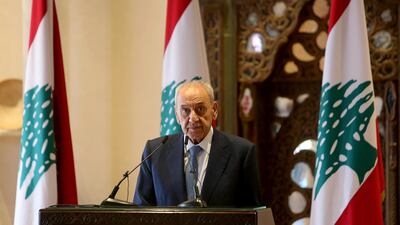Lebanese Speaker Nabih Berri announced a framework for US-mediated indirect talks with Israel.
Israeli Energy Minister Yuval Steinitz also confirmed the talks in a statement, saying they are expected to take place after the Jewish holiday of Sukkot, which ends on October 9, but they did not disclose an exact start date.
Lebanon and Israel, still in a formal state of war, have contested their land and maritime borders for decades, including an area on the edge of three Lebanese energy blocks. The US has been mediating in efforts to bring the two sides to the table, and will assist in upcoming talks.
Indirect talks mean that Lebanese army negotiators will not be speaking directly to members of the Israeli delegation but through UN and US officials.
US Assistant Secretary of State for Near East Affairs David Schenker is expected to visit Beirut in around two weeks time.
In a call with journalists on Thursday Mr Schenker stressed that the framework is not an actual agreement and the ultimate goal is to delineate the border.
“It is a framework [agreement] it is not an actual agreement yet to delineate the borders and share resources,” he said.
The goal of the agreement would be settling the maritime dispute between Lebanon and Israel over blocs 8,9 and 10, Mr Schenker added.
An Israeli official said last week that a deal had been reached, but there was no immediate Lebanese or US confirmation at the time. The official said Mr Steinitz will lead the Israeli delegation.
“We are hoping to start direct negotiations in the near future. Our presumptive goal is to arrive at a peaceful resolution on the matter of the Exclusive Economic Zone bordering between Israel and Lebanon in a way that benefits both neighbouring nations,” Mr Steinitz said in a statement.
US Secretary of State Mike Pompeo welcomed the decision, saying it was the "result of nearly three years of intense diplomatic engagement".
He added the framework has "the potential to yield greater stability, security, and prosperity for Lebanese and Israeli citizens alike."
Mr Berri said the framework discussions would be held under the auspices of the United Nations in a base near the UN-monitored boundary with Israel, known as the Blue Line.
The UN peacekeeping force in southern Lebanon known as, UNIFIL, welcomed the agreement saying it stands ready “to extend to the parties all the support at its disposal and facilitate efforts towards a resolution of this issue.”
The border talks initiative was announced after US sanctions were imposed on Mr Berri's right-hand man for corruption and financially enabling Hezbollah. But he said the two were not linked and Ali Hassan Khalil has not been and will not be involved in the negotiations, despite remaining "close" to Mr Berri.
"This agreement happened on 19 July 2020," he told a press conference.
"There were no sanctions then, there were sanctions on Ali Hassan Khalil and others. The agreement was already done so there is no link."
Asked by The National if these talks mean that Mr Berri and other politicians are off the hook when it comes to US sanctions, Mr Schenker said the administration does not preview its sanctions and those efforts would continue.
Mr Berri said he had been working on the framework "for a decade," long before the Gulf states began considering normalising relations with Israel, but would not be drawn further on the topic.
"At the time Arab countries were not going in the same direction as now and I’m only going to talk about Lebanon, I’m not going to talk about anything outside that."
The agreement on the framework comes as Lebanon is going through its worst economic and financial crisis in decades. Beirut is hoping that oil and natural gas discoveries in its territorial waters will help it pay back its massive debt.
A deal would help Lebanon increase its resources as it struggles with a deepening economic crisis, Mr Schenker said.
“Lebanon has a financial crisis, it would benefit greatly from financial resources and the Lebanese people want to tap into these resources,” he said.
Lebanon began offshore drilling earlier this year and is expected to start drilling for gas in the disputed area with Israel before in the coming months.
Mr Berri told the news conference that he had asked French President Emmanuel Macron to press energy firm Total not to delay exploration for gas in the offshore area that runs along the disputed maritime border region.
The US will also mediate separate expert-level talks to define unresolved issues related to the Blue Line, which Mr Pompeo said offers "the promise of another positive step for regional stability."

